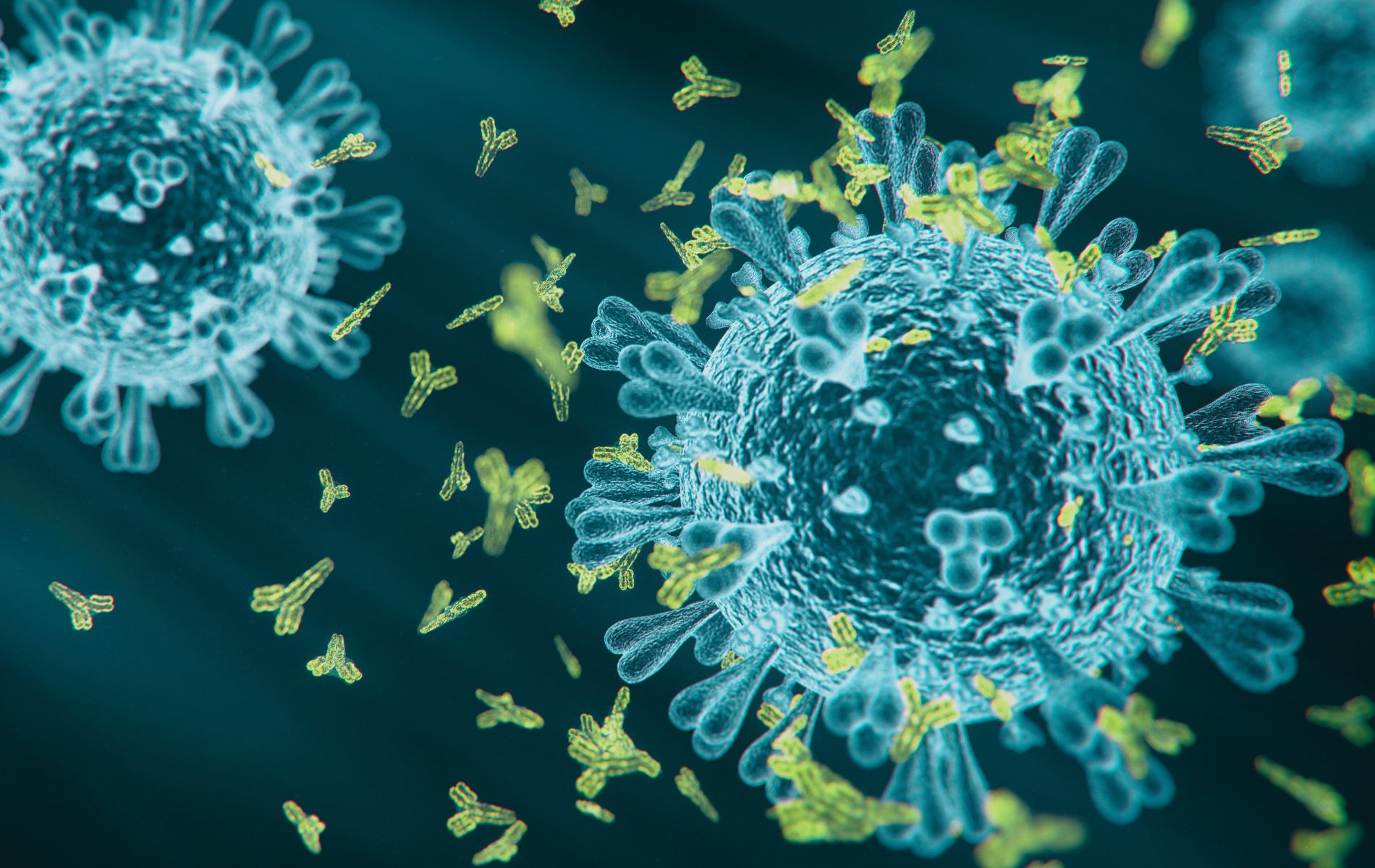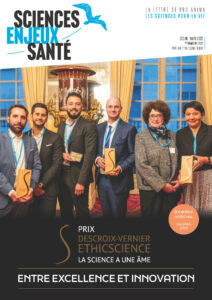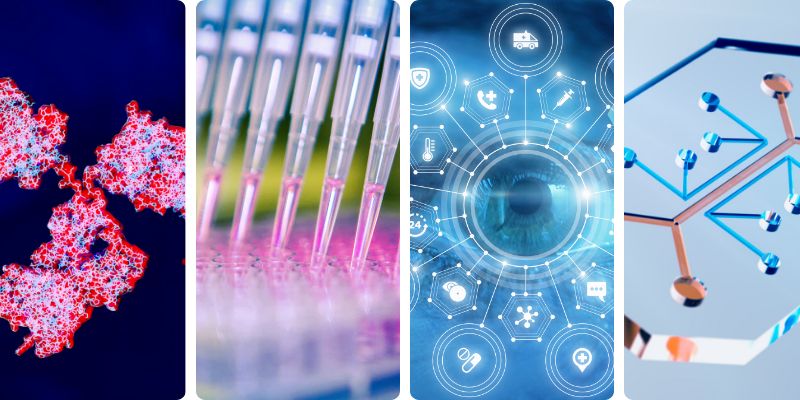
NC3Rs Recommendations to adopt NADAs, the need of a consistent definition of NAMs, the French Medtech 2024, Organoids for Neuroscience Research and more
News on non-animal methods
MARCH 11 - 15, 2024NEWS, REPORTS & POSITION STATEMENTS
1. NC3Rs recommendations to accelerate the replacement of animal-derived antibodies
Non-animal derived antibodies (NADAs) and non-antibody affinity reagents (ARs) support reproducible science that avoids the use of animals, but uptake among the research community remains low. The NC3Rs has published a report of a meeting held last year to discuss challenges and develop recommendations for increasing their use in scientific research. To move the aspirations of the 2023 workshop forward, the NC3Rs hosted a joint workshop with the Only Good Antibodies community focused on improving the integrity and reproducibility of research involving antibodies and other affinity reagents.
To support the research community adopt NADAs and ARs, the NC3Rs aims at :
- Developing freely available resources and materials to raise awareness, including an online platform for scientists, ethical review board members, policy makers and funders, to access up-to-date information.
- Working with NC3Rs-funded researchers and early career scientists to support antibody best practice and form a cohort of NADA/AR champions well-placed to influence research practices of their peers.
- Supporting access to NADA/ARs so that any researcher, irrespective of career stage, can apply these novel tools in their own research. This will include funding mechanisms and partnerships with antibody manufacturers to enable characterisation/validation studies.
- Reviewing the policies and application processes as a research funder. Applicants to NC3Rs funding schemes will be encouraged to consider NADA/ARs and expected to justify their use of animal-derived antibodies.
Read the report on the recommendations to accelerate the adoption of NADAs
2. New Acronym Mayhem (NAM): Why we need a consistent definition of NAMs
NAMs is a common acronym used to represent human biology-based methods in biomedical research. This acronym often refers to human-relevant testing methods like organ chips, organoids, and in silico models, but sometimes can include methods that are not human-relevant, but play a role in reducing the use of animals in testing. In the United States, the term NAMs is used to mean multiple different things including New Approach Methods or Methodologies, New Alternative Methods, Novel Alternative Methods, and Non-Animal Methods.
If you were confused reading the above section, you are not alone. This confusion manifests itself in a significant way : what is a “NAM.” The inconsistent usage of “NAMs” prevents interested parties like those in related fields, policymakers, and the public from easily accessing available information on human-relevant testing methods.
A standardized definition for NAMs is critical to drive accessibility and education on human-relevant research.
TOOLS, PLATFORMS, CALLS
3. Call for Belgian laboratories to express interest to become an EU reference laboratory for in vitro diagnostic medical devices
The new Regulation (EU) 2017/746 on in vitro diagnostic (IVD) medical devices assigns several tasks to the European Union Reference Laboratories (EURL), such as verifying the performance of IVDs of the risk class the highest (class D) and batch testing of Class D IVD Manufacturing.
After a first call for the designation of EURL launched in July 2022 by the European Commission, a second call is now envisaged for the four other categories of class D IVD :
- detection or quantification of arbovirus infection markers ;
- detection or quantification of markers of infection by hemorrhagic fever viruses and other biosafety level 4 viruses ;
- detection or quantification of parasite infection markers ;
- detection of blood group markers.
Deadline for sending interest : April 30, 2024
INDUSTRY, BIOTECH & PARTNERSHIPS
4. Lattice Medical, French Medtech Laureate 2024
Every year, the French magazine Le Point awards innovators or teams of researchers who could change the game in key sectors, Aerospace, IA, Green Tech, Cybersecurity, Foodtech and Agritech, Biotech/Medtech… Selected by a jury of experts – Nobel Prize winners, Turing Prize winners, research directors and captains of industry – the 2024 list of inventors recognizes the innovative work of Lattice Medical.
Lattice Medical is a biotech start-up offering its expertise in tissue engineering dedicated to the design, manufacture, and marketing of medical grade 3D filaments for the development of innovative implants. Lattice Medical CEO, Julien Payen, received this award for the development of MATTISSE, an alternative to conventional breast implants. They offer an absorbable and 3D printed implant that has the specificity of allowing tissues to regenerate naturally.
5. Reinventing the future of the pharmaceutical industry with IA and Owkin
Also awarded by Le Point in its 2024 list of inventors that could play a key role in the Medtech sector, Owkin, co-founded by Thomas Clozel, aims at revolutionizing and augmenting pharmaceutical research using artificial intelligence (IA).
Owkin makes generative AI that connects all stages of biology by using data from American and European hospitals to transform it into knowledge. “Before making the molecules, we must understand where the diseases come from” summarizes Thomas Clozel. “There are many cancers today that we understand nothing about,” he insists. Ultimately, the start-up wants to develop both high-throughput drugs and diagnostic tools with the goal to “Replace big pharma whose model is outdated and which often depend on a single drug. Today, they have become M&A companies.”
News and podcast from Challenges magazine (FR)
SCIENTIFIC DISCOVERIES & PROTOCOLS
6. Organoids grown from amniotic fluid could shed light on rare diseases
Cells taken from the fluid around growing fetuses have been used to make organoids, 3D bundles of cells that mimic tissue. These organoids could help researchers to understand diseases that develop in the fetus during pregnancy.
The researchers grew organoids from lung, kidney and small intestine cells shed into amniotic fluid collected from 12 pregnancies between the 16th and 34th weeks of gestation. This is the first time that organoids have been grown directly from cells taken from ongoing pregnancies, says Mattia Gerli, a stem-cell biologist at University College London and a co-author of the study, which is published in Nature Medicine.
Gerli says that the next steps are to test the capabilities of the congenital diaphragmatic hernia (CDH) organoids for modelling the disease. Comparisons to patient data will be needed to work out how characteristics of the disease are reflected in the gene and protein expression of the organoids. This will begin to answer questions about their usefulness. “We hope this just opens up to more research by us and others,” says Paolo De Coppi, a paediatric surgeon at Great Ormond Street Hospital in London.
7. A No-Brainer : Organoids for Neuroscience Research
Brain organoids are three-dimensional models derived from human stem cells, with the purpose of recapitulating the human brain’s structure and function. The significance of brain organoids extends beyond basic research. They are crucial in addressing the limitations of traditional animal models in neuroscience, and offer a more human-relevant model while addressing the ethical concerns associated with animal research. Moreover, brain organoids have promising applications in drug discovery, personalized medicine, and enhancing our understanding and the treatment of neurological diseases (Quadrato et al., 2017), (Gabriel et al., 2020).
Brain organoids are a significant development in neuroscience research, providing a new means for studying the human brain and its disorders. They are part of a wider range of new tools, techniques, and models, each contributing to our understanding and potential treatment of neurological conditions.


